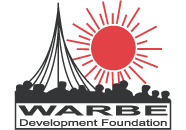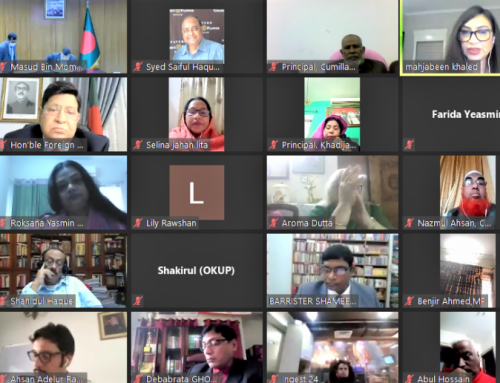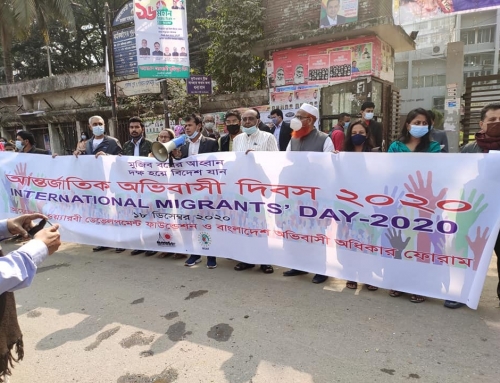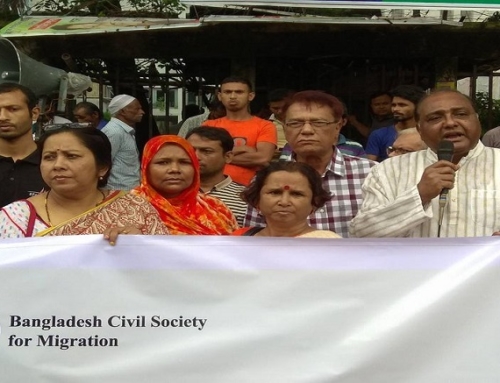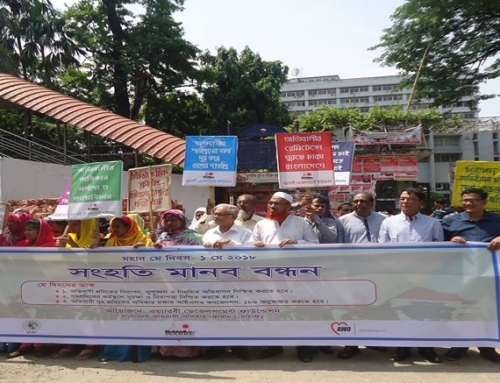Dialogue on Migration Laws and Policies: Access to Justice for Migrants’ and their Families
Speaking as a presenter on Migration Scenario of Bangladesh, WARBE Development Foundation Director Ms. Jasiya Khatoon discussed push factors and pull factors of migration context in Bangladesh. “More than 10 million Bangladeshi migrants are working in 162 countries, but in terms of their contribution in the economy of Bangladesh they didn’t get any facilities,” she said. She also addressed that, like many other developing countries our migrant workers and remittances have been contributing to employment, economic growth, poverty alleviation, and social development in Bangladesh which is almost US $162.166 billion from 1976 to 2016. Besides, she also described the activities of WARBE Development Foundation in grassroots level, national level and international level.
Interview of Victims: Victims also participate to share their story in destination country.
- Farida (Lebanon): It’s almost six months she came back from Lebanon, after the brutal torture of her employer. She went as a household worker but they kept her busy with daily household work. Except fruits she didn’t get any food.
- Shanaz (Lebanon): Shanaz stayed almost one year in Lebanon. She went Lebanon with her sister as household worker. Her sister was stayed near her workplace in the same city. However, the pressure of her work was not so bad. Sometimes she had to endure the food problems. She was happy in her workplace family but she returned because of the sickness of her sister.
Secretary general Md. Faruque Ahmed said that the UN Convention on the Protection of the Rights of All Migrant Workers and Members of their Families 1990 came into force in June 2005, but is yet to ratify it. So it won’t fruitful until the receiving countries ratify it. Mr. Ahmed also thinks that due to the binding of some restriction, receiving countries are delaying it to ratify. We need to stick together and create more awareness in the rural areas, because still they have information gap about safe migration. He also mentioned that, WARBE Development Foundation is receiving a huge number of cases of the horrific abuse and torture faced by Bangladeshi female workers in abroad. Despite our migrant workers are still participating in the labor force and bringing in huge amount of remittance. Whereas counties such as Sri Lanka, Nepal, India, Indonesia, Philippines denounced abuse faced by their workers abroad and have taken steps to protect their rights. According to Law of the migrant workers 2013, he said that If Bangladesh Association of International Recruiting Agencies (BAIRA) & our Government could work together then the laws wouldn’t necessary. So it is important to work together among government, BAIRA and other stakeholders. Finally he emphasized on a shelter house (dormitory) for female migrant worker. So they could return to the dormitory from their workplace.
Mr. Abdullah Al Hasan, Country Director of Lawyers beyond Borders Bangladesh said that Over the years, there have been ample of complaints of our migrant workers facing abuse and exploitation by their employers especially in the Middle East. They are treated like slaves in there. Most country-of-origin embassies in the Middle East provide shelter to domestic workers who are abusing by their employers, but Bangladeshi embassies only offer shelter in some countries. Bangladesh should ensure its embassies to provide shelter for our migrant workers. Due to the lack of primary education, Bangladeshi migrant workers don’t have adequate knowledge what is written in their contract papers, as a result they don’t even know where to compliant. It is important to develop a legal aid center in destination countries, so that they can submit their complain fearlessly. Our TTC can provide them basic knowledge regarding the legal aid center before their departure.
Md. Nazmul Ahsan, Chairman, Bangladesh Ovibashi Adhikar Forum (BOAF) said for those living in remote areas, the main obstacles are information gap before their migration. Indeed, besides the fact that information sources on migration may be scarce in rural areas, rural people, face increased difficulties in accessing reliable information on legal and safe migration channels. The activities of our District Employment & Manpower (DEMO) office are still obscure for them. Our lawyers should develop an idea to provide this basic information in rural areas.
Md. Atiqun Nabi, Executive Director, INAFI Bangladesh mentioned the main reason for migration because everyone wants to live a happily and joyful life, but unfortunately the scenario is totally opposite in real life. Due to lack of some basic information, they suffer for it in their workplace. In that moment, they even could not return in their countries. Bangladesh government didn’t able to ensure better workplace in destination countries. Even our ministry can play an important role to ensure good governance.
Open Discussion: In the open discussion session, lawyers and other representative recommended some points to ensure access to justice for our migrant workers and their families.
- Though most of the migrant workers face food problem in destination countries, in our pre departure training we could get them used to with this problems.
- We could follow up our workers in destination countries after 5-6 months of their departure through a wing.
- Basic guideline to contact with the embassy in destination country.
- Sending countries can create alliance to ratify UN Convention 1990 in destination countries.
Md. Selim Reza, Deputy General of Bureau of Manpower, Employment and Training- BMET said that migration in Bangladesh started since Primitive era. People wanted to move from one place to another place. From the beginning, every year a significant number of people migrated from our country to ensure a better livelihood. It has been an integral part of Bangladesh’s economic and social Development since the 1980s. Every year 20 lac new labors entered into the labor force. Our labor force should also more concern in the primary stages before their departure. Everyone should be registered in the list of Bureau of Manpower, Employment and Training (BMET). Without registration, no one will get any kinds of smart card. In the destination countries, skill workers need for productive labor mark participation. Efforts are required to help establish Bangladeshi workers’ credentials abroad by continuously improving their labor productivity. However, our female workers should be more skilled and concentrate to their workplace. International labor migration yields benefits in both recipient and sending countries. Recipient countries can get their work done by workers from other countries which otherwise could not be done by their own people. For sending countries, movement of people can provide high employment opportunities and contribute to their social and economic development. The income earned by migrants increases welfare of migrant families and strengthens the national economy. So as an asset of our country, they deserve better than their current situation.





